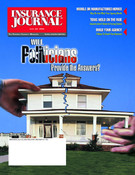The St. Paul Companies have agreed to pay nearly $1 billion to settle outstanding claims and lawsuits related to asbestos. The news comes on the heels of PPG Industries’ agreement to a $2.7 billion settlement of outstanding asbestos claims against subsidiary Pittsburgh Corning, most of which will be paid by its insurance companies. It’s further proof, as if any was needed, that the insurance industry is scared to death of the loss potential posed by asbestos.
The St. Paul’s settlement of liabilities incurred by its subsidiaries, Western MacArthur and USF&G Company, typify the current approach to these cases. As politicians are fond of saying, albeit in a different context, “Let’s move on.”
Under the terms of the agreement the St. Paul is committed to make an initial payment of $235 million, and to fund another $740 million, plus $12.5 million in fees and costs, when bankruptcy proceedings for Western MacArthur and Western Asbestos, from whom it acquired the liabilities to begin with, are approved.
Chairman and CEO Jay Fishman gave a relatively candid analysis of his company’s reasoning in its announcement. “The settlement underscores changes that have taken place in the Western MacArthur
litigation over a very short period of time. Our claim team has worked very hard to assess this matter and bring it to a resolution, which, when completed, will protect our shareholders from future liability.
“A case-by-case, detailed review of our asbestos and environmental claims indicates that this is the only material case we face, placing us in a good position with respect to these issues moving forward,” continued Fishman. “Although asbestos and environmental losses are inherently difficult to predict, based on our case-by-case review and all other information currently available, our aggregate asbestos and environmental reserves represent our best estimate of our ultimate liability for these losses.”
The St. Paul also announced that it already had set aside “aggregate net reserves for asbestos and environmental” amounting to $852 million as of March 31, “a subset of its total net reserves of $15 billion.” Fishman essentially felt the cost was worth it to avoid exposing the company to more claims, and possibly greater losses.
The highly speculative nature of asbestos litigation frightens the whole industry—the family of a New York man, who actually died from asbestos related illness, received $53 million. The decision of a jury in Mississippi was even scarier. It awarded six claimants who weren’t even ill $150 million.
Anyone as familiar as insurance companies are with the U.S. justice system, is aware of the fact that juries can come up with huge awards. Former Attorney General Griffin Bell in a speech sponsored by the U.S. Chamber of Commerce and the National Legal center, as quoted by Reuters News Agency, called it “jackpot justice.”
He’s especially disturbed that judges seem incapable or unwilling to address the crisis and accused them of “dumbing down” the U.S. Justice system by failing to limit the flood of claims. He also drew attention to the fact that Mississippi has attracted around 20 percent of the over half million asbestos claims filed in the U.S., even though it represents only one percent of the U.S. population. To Bell this indicates that lawyers are forum shopping in an effort to maximize damage awards.
The reaction to his remarks from trial lawyers’ associations was swift, vehement and somehow predictable. Essentially—how could a man of Bell’s stature possibly infer that judges should refuse to hear legitimate claims, and juries award appropriate compensation to the injured parties?
That response begs the question, however. As people like James Burcke of Lloyd’s Equitas and many others in both the insurance industry and the legal profession have pointed out, a number of these claims, perhaps even the majority, are filed on behalf of persons who aren’t in fact suffering from any asbestos related disease. This results in diminished recoveries for those who are truly ill, and needlessly rewards those who aren’t and their lawyers.
So far, at least in the U.S., none of this seems to matter. The insurance industry has gone to court on a number of cases, and the results haven’t been encouraging, as they’ve lost most of them. The government has failed to introduce any legislation to address the asbestos problem, and more and more cases continue to be filed. Viewed in this light, Fishman’s decision that the St. Paul should settle up and “move on” makes a great deal of sense.
Was this article valuable?
Here are more articles you may enjoy.


 Nine-Month 2025 Results Show P/C Underwriting Gain Skyrocketed
Nine-Month 2025 Results Show P/C Underwriting Gain Skyrocketed  Allstate Doubles Q4 Net Income While Auto Underwriting Income Triples
Allstate Doubles Q4 Net Income While Auto Underwriting Income Triples  Uber Jury Awards $8.5 Million Damages in Sexual Assault Case
Uber Jury Awards $8.5 Million Damages in Sexual Assault Case  Allstate CEO Wilson Takes on Affordability Issue During Earnings Call
Allstate CEO Wilson Takes on Affordability Issue During Earnings Call 


